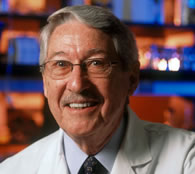News Release: Research, School of Medicine, School of Public Health
Oct. 16, 2008
AAMC Honors Emory Immunologist Max Cooper with Distinguished Research Award

The AAMC (Association of American Medical Colleges) will honor Max Cooper, MD, with its 2008 Award for Distinguished Research in the Biomedical Sciences. Established in 1947, the award recognizes outstanding clinical or laboratory research conducted by a medical school faculty member. Cooper will receive the award on Saturday, Nov. 1, during the association's annual meeting in San Antonio.
More information about the awards is available on the AAMC web site.
Emory's "Sound Science" podcast interview with Cooper is available online.
Cooper joined Emory University School of Medicine this year as a Georgia Research Alliance Eminent Scholar and professor of pathology and laboratory medicine. He also holds appointments as professor at the Emory Vaccine CenterEmory Center for AIDS Research in the Rollins School of Public Health.
One of the most influential scientists in the field of immunology, Cooper is credited with a string of landmark discoveries that now provide a framework for understanding how white blood cells normally combat infections and how they go awry to produce leukemia, lymphomas and autoimmune diseases. Among his earliest discoveries was the finding that there are two distinct types of white blood cells, now known as T and B lymphocytes, which play separate but complementary roles in defending against infections. This is now recognized as one of the most important organizing principles of the immune system.
Currently, Dr. Cooper and his research team are studying a completely new class of antibody-like proteins they discovered which are produced by the immune systems of lampreys and certain other fish. These proteins have unique properties that may make them useful for diagnosing and treating human diseases.
"Dr. Cooper's career is a model to which physicians, scientists and medical educators everywhere can aspire," says Thomas J. Lawley, MD, dean of Emory University School of Medicine. "We are fortunate that he is continuing his groundbreaking research at Emory."
Prior to joining Emory, Dr. Cooper spent 40 years at the University of Alabama School of Medicine (UAB) where he was professor in the departments of medicine, pathology, microbiology and pediatrics. Dr. Cooper was also director of UAB's Division of Developmental and Clinical Immunology in the Department of Medicine for more than two decades, which he headed after serving as director of the Cellular Immunobiology Unit at the UAB Comprehensive Cancer Center for 12 years. In addition to his outstanding reputation as a physician-researcher, Dr. Cooper has influenced the careers of more than 130 graduate students and fellows.
"The impact of Dr. Cooper's many discoveries and insights would be hard to overstate," says Tristram Parslow, MD, PhD, the chair of Emory's Department of Pathology and Laboratory Medicine. "Through his own discoveries and the many other researchers he has trained and inspired, Dr Cooper's influence resonates through all of contemporary immunology."
Cooper earned his undergraduate degree from the University of Mississippi and his medical degree from Tulane University School of Medicine, where he served as a resident in the Department of Pediatrics after completing his internship at Saginaw General Hospital in Michigan.
A member of numerous national and international advisory committees in immunology and infectious disease, Cooper was president of both the Clinical Immunological Society and the American Association of Immunologists. Presently, he is vice president and president-elect of the Henry Kunkel Society at Rockefeller University, a group that encourages clinical, patient-centered research, especially in the field of immunology.
Cooper was elected to the Institute of Medicine of the National Academies in 1988. He has served on the editorial boards of more than 30 scholarly journals and authored more than 220 book chapters and 420 scientific papers.
The AAMC is a not-for-profit association representing all 130 accredited U.S. and 17 accredited Canadian medical schools; nearly 400 major teaching hospitals and health systems, including 68 Department of Veterans Affairs medical centers; and 94 academic and scientific societies. Through these institutions and organizations, the AAMC represents 109,000 faculty members, 67,000 medical students and 104,000 resident physicians.
###
The Robert W. Woodruff Health Sciences Center of Emory University is an academic health science and service center focused on missions of teaching, research, health care and public service. Its components include schools of medicine, nursing, and public health; Yerkes National Primate Research Center; the Emory Winship Cancer Institute; and Emory Healthcare, the largest, most comprehensive health system in Georgia. The Woodruff Health Sciences Center has a $2.3 billion budget, 17,000 employees, 2,300 full-time and 1,900 affiliated faculty, 4,300 students and trainees, and a $4.9 billion economic impact on metro Atlanta.
Learn more about Emory’s health sciences:
Blog: http://emoryhealthblog.com
Twitter: @emoryhealthsci
Web: http://emoryhealthsciences.org
